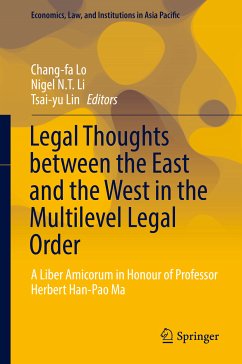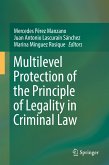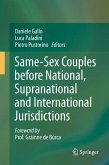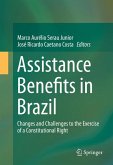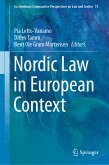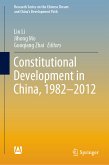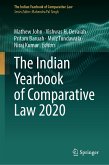Legal Thoughts between the East and the West in the Multilevel Legal Order (eBook, PDF)
A Liber Amicorum in Honour of Professor Herbert Han-Pao Ma
Redaktion: Lo, Chang-Fa; Lin, Tsai-Yu; Li, Nigel N. T.


Alle Infos zum eBook verschenken

Legal Thoughts between the East and the West in the Multilevel Legal Order (eBook, PDF)
A Liber Amicorum in Honour of Professor Herbert Han-Pao Ma
Redaktion: Lo, Chang-Fa; Lin, Tsai-Yu; Li, Nigel N. T.
- Format: PDF
- Merkliste
- Auf die Merkliste
- Bewerten Bewerten
- Teilen
- Produkt teilen
- Produkterinnerung
- Produkterinnerung

Hier können Sie sich einloggen

Bitte loggen Sie sich zunächst in Ihr Kundenkonto ein oder registrieren Sie sich bei bücher.de, um das eBook-Abo tolino select nutzen zu können.
This book focuses on the interaction and mutual influences between the East and the West in terms of their legal systems and practices. In this regard, it highlights Professor Herbert H.P. Ma's achievements and his efforts to bring Eastern and Western legal concepts and systems closer together. The book shows that, while there have been convergences between different legal regimes in many fields of law, diverse legal practices and approaches rooted in differing cultural, social, political and philosophical backgrounds do remain, and that these differences are not necessarily negative elements…mehr
- Geräte: PC
- ohne Kopierschutz
- eBook Hilfe
- Größe: 12.89MB
![Multilevel Protection of the Principle of Legality in Criminal Law (eBook, PDF) Multilevel Protection of the Principle of Legality in Criminal Law (eBook, PDF)]() Multilevel Protection of the Principle of Legality in Criminal Law (eBook, PDF)89,95 €
Multilevel Protection of the Principle of Legality in Criminal Law (eBook, PDF)89,95 €![Same-Sex Couples before National, Supranational and International Jurisdictions (eBook, PDF) Same-Sex Couples before National, Supranational and International Jurisdictions (eBook, PDF)]() Same-Sex Couples before National, Supranational and International Jurisdictions (eBook, PDF)113,95 €
Same-Sex Couples before National, Supranational and International Jurisdictions (eBook, PDF)113,95 €![Assistance Benefits in Brazil (eBook, PDF) Assistance Benefits in Brazil (eBook, PDF)]() Assistance Benefits in Brazil (eBook, PDF)65,95 €
Assistance Benefits in Brazil (eBook, PDF)65,95 €![Nordic Law in European Context (eBook, PDF) Nordic Law in European Context (eBook, PDF)]() Nordic Law in European Context (eBook, PDF)121,95 €
Nordic Law in European Context (eBook, PDF)121,95 €![Affirmative Action Policies and Judicial Review Worldwide (eBook, PDF) Affirmative Action Policies and Judicial Review Worldwide (eBook, PDF)]() George GerapetritisAffirmative Action Policies and Judicial Review Worldwide (eBook, PDF)73,95 €
George GerapetritisAffirmative Action Policies and Judicial Review Worldwide (eBook, PDF)73,95 €![Constitutional Development in China, 1982-2012 (eBook, PDF) Constitutional Development in China, 1982-2012 (eBook, PDF)]() Constitutional Development in China, 1982-2012 (eBook, PDF)121,95 €
Constitutional Development in China, 1982-2012 (eBook, PDF)121,95 €![The Indian Yearbook of Comparative Law 2020 (eBook, PDF) The Indian Yearbook of Comparative Law 2020 (eBook, PDF)]() The Indian Yearbook of Comparative Law 2020 (eBook, PDF)121,95 €
The Indian Yearbook of Comparative Law 2020 (eBook, PDF)121,95 €-
-
-
Dieser Download kann aus rechtlichen Gründen nur mit Rechnungsadresse in A, B, BG, CY, CZ, D, DK, EW, E, FIN, F, GR, HR, H, IRL, I, LT, L, LR, M, NL, PL, P, R, S, SLO, SK ausgeliefert werden.
- Produktdetails
- Verlag: Springer Nature Singapore
- Seitenzahl: 610
- Erscheinungstermin: 11. November 2016
- Englisch
- ISBN-13: 9789811019951
- Artikelnr.: 53152475
- Verlag: Springer Nature Singapore
- Seitenzahl: 610
- Erscheinungstermin: 11. November 2016
- Englisch
- ISBN-13: 9789811019951
- Artikelnr.: 53152475
- Herstellerkennzeichnung Die Herstellerinformationen sind derzeit nicht verfügbar.
